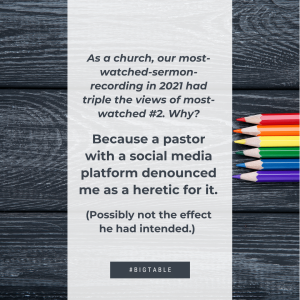I (Bill) love the Bible and read it daily, but there are people out there who call me a heretic. I don’t say this hyperbolically. As a church, our most-watched-sermon-recording in 2021 had triple the views of most-watched #2. Why? Because a pastor with a social media platform denounced it and me. (Possibly not the effect he had intended.) This denunciation was hurtful at the time, yet I actually understood where he was coming from.
You see, like this pastor I grew up thinking that the goal of reading the bible was to come up with the one right answer and then to help (or maybe make?) others see it. My teachers were heavily influenced by the Chicago Statement on Inerrancy & Hermeneutics. It states:
WE AFFIRM that the meaning expressed in each biblical text is single, definite and fixed.
– Chicago Statement on Biblical Hermeneutics, articles VI & VII.
No wonder I was terrified in college when I realized Christians believed different things. The Christians I met in college came from different cultures, different classes, and different parts of the world. But I so badly wanted them and others to believe ‘the right way’ like me.
Fragility Tangles
As a straight, White, cisgender man, I was formed by the stream of Christianity that looked just like me and needed to protect itself from all these other forms of ‘heresy.’ It would be decades later before I’d read authors like Austin Channing Brown who saw beneath the façade. Channing Brown writes, “The white Church considers power its birthright rather than its curse.” She knew it was no wonder that I kept fighting other Christians over ‘the truth.’ I didn’t want to lose my sense of self and all the privilege that came with defining the terms of the argument and adjudicating who was in and who was out.
For years and years I set a guard around my doctrinal fragility, shying away even from seeing that there was theological diversity amongst Christians. Of course, doctrinal fragility is not so far from White fragility – it’s all connected. It’s the slippery slope that they warned you about… If you start talking about racial justice or allowing women to be pastors, the next thing it’ll be the gays, and then all hell will break loose.
We were all protecting the great palace secret, that we’re all somewhere on the slope and that no one has undiluted access to ‘truth.’
“Several Choirs and Some Protest Groups”

After acknowledging that I and my spiritual teachers had our own biases, our own culturally shaped starting places, I could no longer unsee it. I started running into theological diversity, connected to embodied diversity, everywhere. And it was a good thing.
It started with the scriptures – how obvious is it that there are so many tensions and distinct perspectives with scripture!? After all, God saw fit to include four different biographies of Jesus in the New Testament, each with their own perspectives and theological priorities. As Old Testament scholar Christopher Wright put it, in scripture “we are listening, not to a single voice, not even to a single choir in harmony, but to several choirs singing different songs with some protest groups jamming in the wings.”
I saw it in the church’s perspective on LGBTQ inclusion in the community of faith (which before I had convinced myself was monolithic in its condemnation). (More on this journey at my old blog site.)
Finally, I could see affirmations of a wider spectrum of faith journeys everywhere I turned, hearing the Spirit’s whispers in all sorts of places.
Whispers Like:
· The unity of the church… is a lavish celebration of the communion of the different. – Daniel Migliore, Faith Seeking Understanding
· A vibrant diversity within Christian orthodoxy—which is simply to say a range of different ways to faithfully follow Jesus—is a strength of our faith, not a weakness. – Bonnie Kristian, A Flexible Faith
· It is not our differences that divide us. It is our inability to recognize, accept, and celebrate those differences. – Audre Lorde, Sister Outsider
· The true wealth of the church as God’s kingdom is the realization that all the differences among the world’s people come from God. – Archbishop Oscar Romero, The Scandal of Redemption
These days I’m learning how to dialogue and partner with people and ideas from all over the theological spectrum. I’m leaning into Toni Morrison’s vision: “I am working for a world in which diversity is seen as a source of celebration rather than a cause for alarm.”
And if that makes me a heretic… no, it just doesn’t.